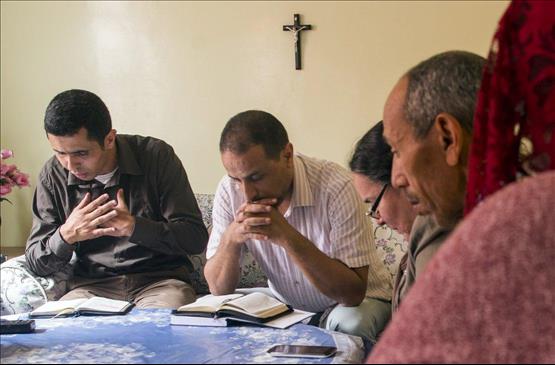
Religious Minorities Face Persecution in Morocco: US State Department
More than 99% of Moroccans are Sunni
Sunni Muslims are the majority in Morocco. The US government estimates that 99 percent of the Moroccan population follows the Sunni doctrine, while the rest of the beliefs represent less than 1 percent. This minority includes Christians, Jews, Shia, and Baha'i Muslims, the latter being a messianic sub-current of Shi'ism.According to the Jewish community leaders cited by the study, there are about 3,000 to 4,000 Jews in Morocco, about 2,500 of whom live in Casablanca. Moroccan Christian leaders estimate that there are between 2,000 and 6,000 Moroccan Christians spread throughout the country, although some say it could be up to 50,000.
Shia Muslim leaders estimate that there are tens of thousands of faithful in Morocco, the majority of whom are settled in northern Morocco. Shia foreign nationals come mainly from Lebanon, Syria, and Iraq. Finally, the Baha'i community is thought to have between 350 and 600 members across the country.Repressions of Religious Minorities
"Some local Christians reported authorities pressured Moroccan Christian converts to renounce their faith." This is one of the serious accusations contained in the US State Department's report on the situation of religious freedoms in the world in 2016.The report speaks mainly of Moroccans who have a different religion from the state: Christians, Jews, Shiite Muslims, Baha'is, and other religious groups.
While the 2011 Constitution guarantees freedom of worship, several religious minorities remain persecuted by society but also by the penal code in Morocco, a contradiction that the US State Department refers to on numerous occasion in its latest report."Fear of government harassment and reported societal, familial, and cultural pressure led some local Christians, Bahais, and Shia to refrain from public worship and instead meet discreetly in members' homes," stresses the report published August 15.
"According to human rights organizations and local Christian leaders, the government occasionally detained and questioned Moroccan Christians about their beliefs and contacts with other Christian," notes the DRL, which states that some Moroccan Christians have been "forced to abandon their faith."During the arrest of a Moroccan Christian living in Salé, the police accused him of "apostasy" and wanted to "reconvert him to Islam," says the report quoting the National Federation of Amazigh Associations (FNAA). The complaint lodged with the Ministry of Justice by the applicant in March 2016 was not followed by the initiation of an investigation, states the report.
Christians are not the only religious minority persecuted in Morocco, the report adds, as "several non-Muslims were arrested and imprisoned for eating or smoking in public during Ramadan."A Moroccan Shia leader, Abdou El Chakrani, is also cited in the report. Arrested in 2016 for "alleged financial improprieties," El Chakrani "was targeted for his religious beliefs and his attempt to register an association affiliated with known Shia leaders," according to Shiite officials quoted by the DRL.
A confusing legal frameworkThe US State Department point out several laws that undermine freedom of belief. Among them, "the fact that Sunni Islam and Judaism are the only religions recognized by the State for native Moroccans," "the prohibition of criticizing Islam on public platforms," "the criminalization of the rupture of the fasting during Ramadan for the people known to be Muslim," or the specifications of the HACA which obliges Moroccan televisions and radios to dedicate 5 percent of their programming to Islamic content.
Although the Moroccan Constitution guarantees freedom of thought, expression and assembly, Morocco is a sovereign Muslim state and Islam is the official religion. Thus, according to the report, the Constitution states that "the king holds the Islamic title of commander of the faithful, is the protector of Islam and is the guarantor of freedom of worship in the country."The Constitution cites international conventions and insists on respect for universal principles of human rights. It stipulates, however, that this respect for international conventions must be "in accordance with the provisions of the Constitution, the constants and the laws of the Kingdom."
Criminal law prohibits any attempt by non-Muslims to "shake the faith" of Sunni Muslims and punishes any Muslim who has converted to another religion with six months to three years' imprisonment and a fine of MAD 200 to 500.Moreover, according to the Moroccan legislation in force, freedom of conscience can only be combined in one sense: the conversion of Christians or Jews to Islam. The opposite is rejected legally and condemned socially.
Intolerant societyThe outlook for societal acceptance of religious minorities is not getting any brighter, according to the State Department. The US report recalls the collective attacks in June 2016 against a man in Marrakech and another in Rabat for having smoked cigarettes during Ramadan. Moroccan Christians have also denounced pressure from their relatives and friends to convert to Islam or renounce their Christian faith.
Finally, members of unrecognized religious minorities, including Shias, confessed that they practiced their faith in secrecy for fear of social harassment, professional discrimination, or potential violence by "extremists."
Legal Disclaimer:
MENAFN provides the
information “as is” without warranty of any kind. We do not accept
any responsibility or liability for the accuracy, content, images,
videos, licenses, completeness, legality, or reliability of the information
contained in this article. If you have any complaints or copyright
issues related to this article, kindly contact the provider above.
Most popular stories
Market Research

- Pepeto Presale Exceeds $6.93 Million Staking And Exchange Demo Released
- Citadel Launches Suiball, The First Sui-Native Hardware Wallet
- Luminadata Unveils GAAP & SOX-Trained AI Agents Achieving 99.8% Reconciliation Accuracy
- Tradesta Becomes The First Perpetuals Exchange To Launch Equities On Avalanche
- Thinkmarkets Adds Synthetic Indices To Its Product Offering
- Edgen Launches Multi‐Agent Intelligence Upgrade To Unify Crypto And Equity Analysis


















Comments
No comment